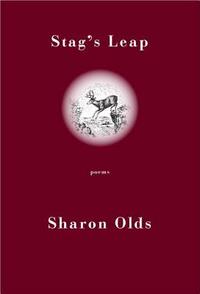Take a photo of a barcode or cover
I feel like Olds' poems are so full and tense that I need to read them again to think what I might say about them. But I do remember being amazed from the first few poems.
-
A grand monument to loss, “Stag’s Leap” is Sharon Olds’ poem collection published a decade after her divorce. I read it once, years ago, almost in fear, too fast, unable to hold all that pain, so this autumn I read it again, with a friend this time, so we could unfold it together.
Olds’ superb turns of line and intimate poems uncover each moment of lingering desire after being left by a loved one, compose odes to his skin & body, write songs to be able to laugh, calm & put balms on all the pain. With each page, the story of their relationship gets layered, returning again and again to its main themes: being left for another (I am so ashamed / before my friends - to be known to be left / by the one who supposedly knew me best /17); not seeing the one you love clearly, but admiring him dearly (I knew and did not
know his brain, and its woody mountain / casing, but the sheer familiarness / of his brow was like a kind of knowledge, / I had my favourite pores on its skin /28); the ache of not being in the gaze of love anymore (Now I come to look at love / in a new way, now that I know I'm not / standing in its light. /4) and being unfit for one another (he did not feel happy when words were called for, and I stood. /33). The book flows from a soft denial, to acceptance and deep grief, longing and forgetting, and rarely to rage (Sleep and dream - but not of his return. / Since it cannot harm him, wound him, in your dream. /67).
The incongruence between her being a poet, a confessional writer who uncovers her life to the public, and him being a private person (a doctor) is often touched upon, seemingly being one of the keys to their inability to truly see each other. Given the turn in their relationship, this book never went “past” his reading before being published, but all previous ones did (according to an interview with the author). It’s always an interesting question for a writer how to consider others in one’s writing, and “Stag’s Leap” brings to the fore that maybe, for some, being written about will always be a strange, unpleasant experience.
“and I saw, again, how blessed my life has been,
first, to have been able to love,
then, to have the parting now behind me,
and not to have lost him when the kids were young,
and the kids now not at all to have lost him,
and not to have lost him when he loved me,
and not to have lost someone who could have loved me for life.” /14
-
A grand monument to loss, “Stag’s Leap” is Sharon Olds’ poem collection published a decade after her divorce. I read it once, years ago, almost in fear, too fast, unable to hold all that pain, so this autumn I read it again, with a friend this time, so we could unfold it together.
Olds’ superb turns of line and intimate poems uncover each moment of lingering desire after being left by a loved one, compose odes to his skin & body, write songs to be able to laugh, calm & put balms on all the pain. With each page, the story of their relationship gets layered, returning again and again to its main themes: being left for another (I am so ashamed / before my friends - to be known to be left / by the one who supposedly knew me best /17); not seeing the one you love clearly, but admiring him dearly (I knew and did not
know his brain, and its woody mountain / casing, but the sheer familiarness / of his brow was like a kind of knowledge, / I had my favourite pores on its skin /28); the ache of not being in the gaze of love anymore (Now I come to look at love / in a new way, now that I know I'm not / standing in its light. /4) and being unfit for one another (he did not feel happy when words were called for, and I stood. /33). The book flows from a soft denial, to acceptance and deep grief, longing and forgetting, and rarely to rage (Sleep and dream - but not of his return. / Since it cannot harm him, wound him, in your dream. /67).
The incongruence between her being a poet, a confessional writer who uncovers her life to the public, and him being a private person (a doctor) is often touched upon, seemingly being one of the keys to their inability to truly see each other. Given the turn in their relationship, this book never went “past” his reading before being published, but all previous ones did (according to an interview with the author). It’s always an interesting question for a writer how to consider others in one’s writing, and “Stag’s Leap” brings to the fore that maybe, for some, being written about will always be a strange, unpleasant experience.
“and I saw, again, how blessed my life has been,
first, to have been able to love,
then, to have the parting now behind me,
and not to have lost him when the kids were young,
and the kids now not at all to have lost him,
and not to have lost him when he loved me,
and not to have lost someone who could have loved me for life.” /14
emotional
reflective
medium-paced
emotional
reflective
slow-paced
reflective
sad
slow-paced
emotional
reflective
sad
slow-paced
emotional
reflective
medium-paced
I can't remember the last time I read a book of poetry. This one had many poems that moved me and many that didn't move me as much. It did not motivate me to pick up other poetry books.
the way she thirsts after this man even after he cheated… with his work colleague.. and told his wife not to come to the work event bc it would make the mistress uncomfortable… I’m speechless. I haven’t read a poetry collection, I don’t think ever so I was confused a lot. I didn’t care for this man at all so I didn’t like learning about all his details. My favorite poem was “telling my mother”
Sharon Olds' book of poetry, Stag's Leap, describes coming to terms with her grief over her divorce. Olds loosely works through the different stages of grief describing the loss of a partner to another woman, the effects on her children and family, and the eventual acceptance and mutual respect she and her ex-husband come to have for each other.
Honestly, this book of poetry while rich in imagery and emotion just really wasn't my cup of tea. But then maybe I am also not the right audience for it.
Shelved in Adult Nonfiction - Literature (811), I would recommend this book for anyone that is mourning similar circumstances and/or loves poetry with deep emotional ties.
Honestly, this book of poetry while rich in imagery and emotion just really wasn't my cup of tea. But then maybe I am also not the right audience for it.
Shelved in Adult Nonfiction - Literature (811), I would recommend this book for anyone that is mourning similar circumstances and/or loves poetry with deep emotional ties.
Simply stunning. A beautiful collection of poetry about a woman's divorce, in which her husband of more than 30 years leaves her for another woman. Truly beautiful, very honest and raw. Wonderful writing.



